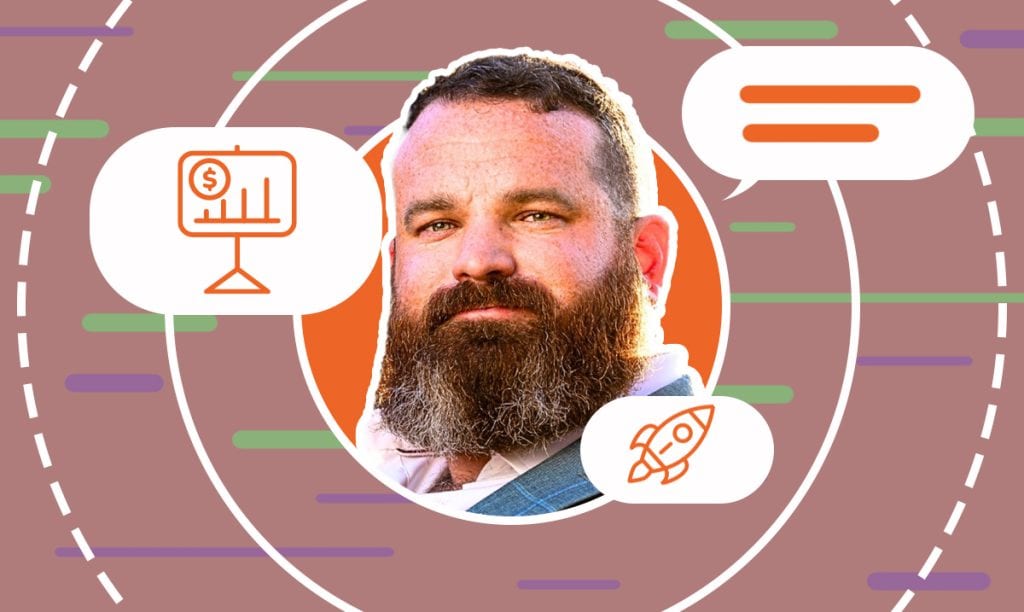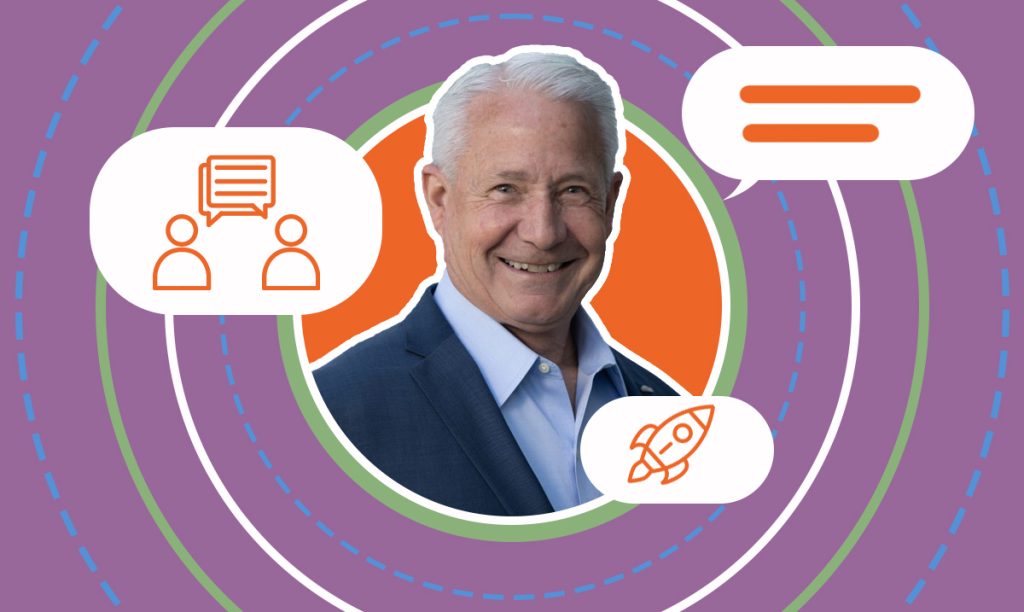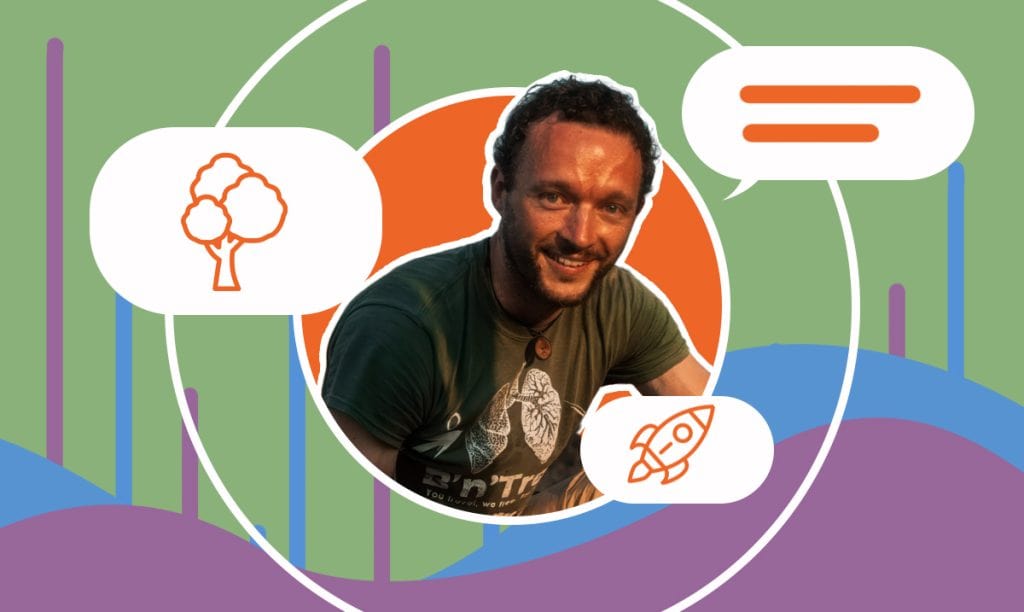In this interview, David Pere, the founder of From Military to Millionaire, shares his inspiring journey from the Marine Corps to financial freedomt ...
Lensa’s Innovative Path in Job Market Technology
Written by: Esther Strauss
Esther is a business strategist with over 20 years of experience as an entrepreneur, executive, educator, and management advisor.
Published on January 18, 2024

Today, we have the pleasure of speaking with Robert Kormoczi, the head of marketing communications at Lensa, a pioneering job search platform. Lensa has harnessed cutting-edge technology and innovative marketing strategies to connect millions of job seekers with their ideal career paths. As a key figure in shaping the company’s growth and outreach, Robert brings a wealth of knowledge about the intersection of technology, marketing, and the ever-evolving job market.
In this interview, we’ll explore Lensa’s journey and its impact on the job search industry and glean insights that are valuable for entrepreneurs and business leaders alike. Join us as we delve into the world of Lensa with Robert Kormoczi at the helm.
Genesis of Lensa
SBS – What was the idea behind Lensa, and how did it all start?
Robert – I’ve been here with the company for a year and a half, but our CEO Gergo started it in 2016. In many other interviews, he stated that the job search platforms or the job search process itself are kind of broken and outdated. A lot of people have a hard time finding the right specific roles in their careers and have to go through multiple interviews and multiple rounds. There is much red tape and many hindrances in the process.
With Lensa, the solution was to have a career matchmaking system that allocates certain skills that you have with the requirements of certain job aspects that companies are looking for. In a funny way, it’s like we are the Tinder of job search, where we find and match people based on their desires and skills with what recruiters are actually expecting.
We have millions of jobs on our platform (20+ million). We try to match the right candidates with the right jobs via email, SMS, or any other way; we offer them a couple of options based on the data and preferences they give us.
We only focus on the US market and US job seekers, so we aren’t like LinkedIn or Glassdoor, these big giants.
Navigating the Tech Landscape
SBS – What are the main challenges and benefits of integrating Amazon Web services with Lensa?
Robert – That’s actually a very techy question. I have a fundamental understanding because earlier, before I worked with the company, they used Google Cloud to store their data. But with all these tremendous sums of data, you need to store it somewhere larger. This is just an oversimplified explanation of this. AWS really caters to our needs in terms of providing the best services for our servers so we can, in an agile and efficient way, provide it for all job seekers. Just imagine tens of millions of job searches and job data information from everyone flying around the web. This is the best way for us to make it as quick and seamless as possible for our clients.
Optimizing Job Matches
SBS – How do you effectively use large data volumes to improve job matches?
Robert – What we expect is that when someone finds our website, they sign up and input certain data. Within that, they can do a filtering process in which you enter specific data points about yourself, your qualifications, your demographics, where you’d like to look for a job, and what your preferences are. Over the years, we have developed this more narrowly so we can give people more or better suggestions. Once you’ve given us all this information that we need, you immediately get the sort of jobs within that demographic and within that bubble. Based on the information that you provided, you will get an email or any kind of notification that you want from us. From the career provider side, we acquire that data from partners as well.
Tech Complexity and User-Friendly Design
SBS – How do you balance this complex tech side with user-friendly design?
Robert – It all comes down to an oversimplification of our dashboard. What we really tried to focus on (esecoally this year) is better customer experience, which means the platform is as simple and easy to use as possible. It’s like an application that brings down the simplicity to the same level as signing up for, for example, Facebook, Twitter, or any social media platform. There is actually no real complexity within this, especially from a user experience.
I guess the true complexity, if we were to ask it from a marketing perspective, is building awareness of our services and building up brand trust. The market, in any way, is pretty saturated, even in just the US. There are LinkedIn, Glassdoor, Monster, CPA, SnagAJob, and so many others. People may ask, “Why should we go to Lensa?”
So, it comes to the brand trust and brand awareness that we try to give to our page visitors and our existing or future customers (if we can call them that way). One way is through positive reviews; for example, on Trust Pilot and Better Business Bureau, we have great reviews. If we were to compare it with all other platforms, on Trust Pilot, on a score of one to five, we have 4.2, which is significantly higher than our competitors.
In terms of marketing and brand awareness, we put a lot of emphasis on SEO, PPC, thought leadership, and digital PR. We really try to get the attention of some of the major players to get awareness in every platform possible. So we work with Forbes, News Weekly, Entrepreneur, Inc. Magazine, and all these big names.
Driving Forces
SBS – What are the key factors that have driven Lensa’s growth over time?
Robert – We still want to continue on a trend of growth without having any outside investors of series A, series B, or seed round investors. There is one option — that we have an IPO, and to reach that stage, we still have a bit to go, but I think that is a possibility, especially with the current rate of growth and independence that we have. I think that would be one of the most realistic options because our CEO had multiple opportunities or offers from external investors and shareholders to enter, and he, so far, has not approved that. I believe we still want to work independently, and we have a lot of trust in our sales, our marketing, our developers, and everything. So, currently, we’re still on a path towards growth.
Customer-Centric Growth
SBS – How much is customer feedback important for the evaluation and the growth of Lensa?
Robert – Extremely. To give you a very good example of this case, we have already established Lensa in a way that is sustainable, and we can grow it even more. At the moment, we’re about 120 people, and we’re still going to grow significantly in the future (at least, that is my belief).
On the other side, we have just launched a new B2B-oriented program for recruiters and hiring managers. We call it FastTalent. Basically, FastTalent supports all these hiring managers to find talent within our jobs, within the platform itself, and advertise certain jobs in different regions across the US. This is in the early stages of development, and with one of my colleagues, we wanted to get G2 or Capterra reviews. Without having these reviews, how do you ensure the trustworthiness of your service, especially when you’re charging $99 for the basic package? We are still significantly cheaper than our competitors, but still, it’s at such an early stage that if someone visits the website through our leads, or we get marketing-qualified leads and they see our service, they’ll say, “They will cater to our needs, but how can I trust them?” That’s where all these different reviews would come into play.
Safeguarding Privacy
SBS – How do you ensure the data privacy?
Robert – We prioritize user data privacy through various measures. Internally, we use collected data for essential services, research, and customer understanding. Some user data, including photos, may be publicly available, and sharing with third parties, such as employers and service providers, occurs, including the transmission of data to Applicant Tracking Systems upon user request.
While users can opt out of unsolicited messages, third-party actions are beyond our control, and we disclaim liability for potential losses. External websites linked on our site have their privacy policies, and we encourage direct communication with them. Compliance with legal obligations includes disclosing user data to law enforcement or regulatory authorities when required. In summary, Lensa is dedicated to safeguarding user data while enhancing the job search experience.
Business Evolution
SBS – Can you describe Lensa’s evolving business model?
Robert – Lensa’s journey over the past few years has been marked by significant transformations aimed at enhancing our services and expanding our reach in the job market. Among the noteworthy changes, we successfully launched a user-friendly app, introduced an affiliate program, and elevated the overall customer experience to unprecedented levels.
However, perhaps one of the most pivotal shifts in our business model has been the strategic expansion from solely catering to job seekers to actively engaging with job providers. The introduction of FastTalent stands as a testament to this evolution, as it serves as a dedicated job posting platform. FastTalent provides a seamless interface for recruiters and talent seekers, facilitating efficient and targeted connections in the hiring process.
This shift signifies a departure from a strictly Business-to-Consumer (B2C) focus to a more comprehensive Business-to-Business (B2B) orientation. By embracing the B2B realm, Lensa not only addresses the needs of individual job seekers but also establishes itself as a valuable partner for companies and recruiters in their quest for top-tier talent.
Leveraging our extensive experience and cutting-edge technology, Lensa now plays a dual role as a platform that empowers individuals in their job search journey and empowers businesses in their pursuit of the best talent available. This evolution not only reflects our commitment to staying at the forefront of the job market but also positions Lensa as a versatile and indispensable resource for both job seekers and providers alike.
Lensa’s Adaptability to Changing Trends
SBS – How does Lensa adapt to changing trends in the job market?
Robert – We also want to be early adopters of AI.
Just imagine it this way: You are a job seeker. You’ve been to different platforms. It’s becoming boring, it’s annoying.
The job search process nowadays can take months, if you’re very lucky, possibly weeks, but usually — at least in my case — months. How do we shorten this time span from the period of you starting to look for a job till you actually get one?
We are trying to shorten this as much as possible.
Firstly, I did mention the matchmaking system, which helps you provide the best jobs that you need and also what the recruiters are looking for.
But also with AI, we are in the process of implementing AI-generated CVs or resumes and cover letters, which can help shorten the time you spend looking for a job. There are so many companies out there, especially the big ones, the conglomerates, who want you to create a CV, and they, every time, look through different keywords and want to measure your dedication.
With AI, you could actually create separate resumes and cover letters for each company. Imagine if you were to write a new one for each of them. What most people do, especially in my case, is just change certain sentences like, “I’m writing this letter to work for Morgan Stanley,” then, “I’d really like to work for Bank of America.” You could completely rewrite this and save a lot of time and energy while still showing your dedication to the specific job. These are the first stages of AI that we want to implement.
The second AI implementation stage is that for FastTalent. If you are a recruiter, you could implement AI to help you write job posts themselves and formulate the skills and expectations you are looking for. For example, like on LinkedIn, when you look for jobs, you see the description, what the company offers, and everything. If you need a bit of help, we have implemented AI into that, so you could get some help writing those yourself, and you can review and edit it and then publish it the way you want it.
Navigating the Early Years
SBS – What were some early challenges that Lensa faced in the first couple of years when it started?
Robert – These are just the horror stories that I’ve heard even before coming here. I don’t really know about the very first few years, but I do know that the company had to let go of a lot of people during the COVID era. COVID was very difficult, and a lot of things with Lensa depend on the US job market. If the job market gets disrupted, so will people’s reaction to searching for jobs. Of course, there’s usually an aftermath of the economic situation. So Lensa had learned to become an early adopter of these shifting changes. But I believe back in the COVID era, there was a really difficult time for the company. They managed to resolve the situation like a lot of companies all over the world
I can give more feedback on last year. It was, I would say, a rather difficult year, and we had to unfortunately let go of some people. Last year was more like a tech layoff wave in many startups and companies across the world, especially in the US. We also, to a lesser degree, experienced this, but not as much as our competitors, who had to let go of 30% to 40% of their force. However, our net income was hit, so it wasn’t as good as we had expected.
We are really hoping for a recovery in 2024. Still, we did have a pretty significant year. But a lot of the things that we wanted to implement, a lot of projects, especially with FastTalent, we put a lot of energy and resources in and we’re still looking for it to pay off, especially in 2024.
Google Core Updates are another story. Oh my God! An SEO specialist looking at our traffic via Semrush, Ahrefs, or any SEO platform is going to see huge ups and downs.
A Culture of Creativity in Lensa
SBS – How do you encourage innovation in Lensa?
Robert – From my perspective, it’s catering to the market needs. I always like to keep an eye on our competitors and what they do, and either try to improve that or go around it in some way to provide a different service. With the developers and the tech team, I can’t really speak on their behalf. But with marketing, if I see that we are falling behind in some ways in terms of marketing campaigns, we try to implement new outreach campaigns and new strategies.
Right now, with the SEO going down, we are moving into thought leadership, where we provide more content to platforms that publish with us regularly, for example, with Forbes, Inc. Magazine, or News Weekly. So, with our organic blog content traffic going down, we will adapt and try to boost it up on different platforms that are possibly not ours under our own name so we can still get the branding benefit. That’s just one of the ways that we try to do it.
Future Horizons
SBS – What are some future goals for Lensa?
Robert – We have implemented a lot of features, especially last year. Number one, as mentioned, is the customer experience improvement in every way possible, especially implementing AI systems to shorten their burden when they do resumes or look for jobs.
Secondly, FastTalent. We would really like to scale it up. It’s in very early stages, so we want to get not only just reviews but also to know what the customers actually want and are looking for and provide a better service than our competitors. It’s still a process towards finding out the best ways to succeed and getting the most qualified leads. It’s A/B testing a lot of things and then, of course, scaling up Lensa — the whole platform itself.
And here’s our big dream, possibly not for 2024 but in the future. As our CMO, who joined us a few days ago, said if Lensa would be in the top three job search platforms in the US, that would be fantastic. I would be happy if we’d be even in the top five. That would be remarkable. But I do strongly believe we could make a significant step forward in every way possible, especially at the current rate that we’re growing, so I’m very optimistic.
Subscribe to Our Newsletter
and gain insider access to cutting-edge business insights and trends.
Featured Resources

How David Pere Helps Veterans Achieve Financial Freedom
Published on April 3, 2025
Read Now

Empowering Entrepreneurs with a Consultative Banking Model
Published on January 23, 2025
When it comes to business banking, a one-size-fits-all approach doesn’t cut it — just ask Endeavor Bank. Since its founding in 2017, EndeavorBan ...
Read Now

How Click A Tree Makes Sustainability Simple for Businesses
Published on January 20, 2025
In this interview, Chris Kaiser, the founder and CEO of Click A Tree, shares his journey of creating a company dedicated to making sustainabilityacc ...
Read Now
Comments